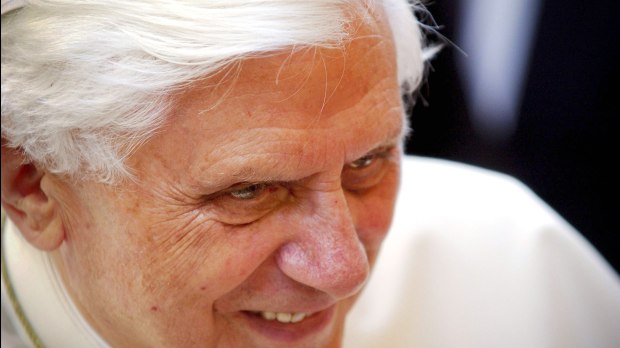55) Give the much-maligned Pope Benedict XVI a fair reading sometime. You’ll be surprised.
About a year or so ago I found myself in the middle of one of those social media imbroglios we should all know better than to take part in. A supposed “fan” of Pope Benedict’s had attributed a sentiment to him that, in light of what I know of Papa Ratzinger, made no sense to me. I asked this rather cranky anonymous entity about it, and there ensued a very strange conversation: the more I quoted Benedict to this person, the angrier he or she became with me.
It was the tenderness of Benedict that seemed to be throwing this person off.
“Tenderness” is a word that has been used with some frequency by his successor, Pope Francis; it is not a word people associate with Benedict. For the ignorant and the perpetually angry, Papa Ratzinger is only a caricature –“God’s Rottweiler.” For others, he is stern rule-keeper, which is just another kind of caricature.
What Benedict was, and is, is a Christ-lover; before he is anything else, he is all Christ’s. To plumb his depths is to begin to drown in a love that is maddening in a way, because it relentlessly points us away from our own concerns for something deeper and finer; something that makes us truly royal children of a Revolutionary King.
What ended the social media contretemps was my reminding the cranky one of Benedict’s exhortation that all people needed to hear the words, “It is good that you exist.”
Interestingly, at that point someone else — a witness to the cyber-melee — who, reading through the mess of input, saw those words “It is good that you exist” and, assuming they belonged to Pope Francis, remarked “very Jesuitical!”
That person, too, was shocked to learn that the words came from Benedict.
When Father Joseph Ratzinger predicted the future of the church
Some time later, I gave a friend of mine a copy of Co-Workers of the Truth: Meditations for Every Day of the Year. She likes “daily-reading” books, but when she saw it was Ratzinger-written she objected. “You know I don’t like him,” she told me.
Yes, I knew. “But you’ve never read him.” I said. Reminding her that she is a fair-minded person, I urged her to give the book a chance.
And then one day, she called me, in tears. “He is beautiful!” She said. “I had no idea!”
It seems that a daily serving of Benedict had begun to warm her up, but what got her blowing her nose over the phone was the excerpt for Tuesday, February 18:
The sum of human life does not strike a balance if we omit God; in that case, only contradictions remain. It is not enough, then, to believe somehow theoretically that there is a God; we must regard him as the most important element in our life. He must be everywhere. And our fundamental relationship to him must be love. That can often be very difficult. It can happen, for instance, that one individual has many illnesses… poverty makes life difficult for another. Yet a third loses the persons on whose love his whole life depends… And there is a great danger that the individual will become embittered and will say: God can certainly not be good; if he were, he would not treat me this way. Such a revolt against God is very understandable; often it seems almost impossible to accept God’s will. But one who yields to this rebellion poisons his whole life. The poison of saying “No,” of being angry with God and with the world, corrodes the individual from within. But what God asks of us is, at is were, an advance of confidence. He says to us: “I know, you don’t understand me yet. But trust me anyway, believe that I am good, and dare to live by this trust.” There are many instances of saints and great individuals who dared to trust and, in consequence, found for themselves and for others true happiness amid the greatest darkness. — from Auf Christus schauen, pp 109-110
“It sounds just like Francis! Like something he would say!” My friend said.
Well, it sounds like Peter, really. This week sees the US release of Benedict XVI: The Last Testament, what is purported to be the last interview he will give to Peter Seewald. As his other talks with Seewald have been phenomenal, I can’t wait to dig into it and see what Papa Ratzi has to tell us about his life, and his joys and regrets, and what last things he has to tell us about the life of faith.
If you have been reluctant to read Benedict, perhaps let this be one final act of mercy as the Year of Mercy draws to a close: give the Pope Emeritus an opening to teach you what he knows. I have never known anyone who has read him and been disappointed.

